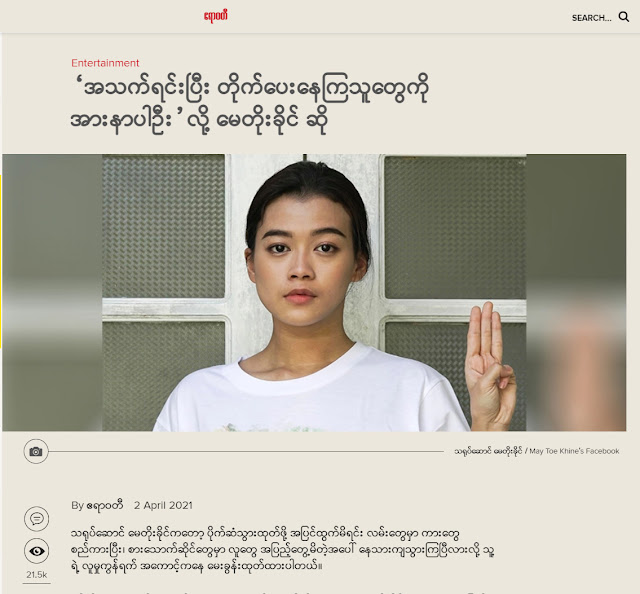 |
| Examining the use of the untranslatable phrase Aar Nah Dae in Burma under seige |
This week, the Burmese military unleashed its firepower on the town of Thantalan (also Htan Talan) in Chin State. RFA reported, "Junta troops entered Thantlang township on Friday morning, began looting the property of residents, and then set fires that burned more than 200 homes as well as some churches."
As news of the attack spread, Burmese Facebook users began sharing a meme showing the name of the town in Burmese script engulfed in flames. Some were seething with outrage, demanding the international community to intervene. Others expressed their solidarity with the displaced townsfolks.
In one post, the untranslatable Burmese expression အားနာတယ် (aar nah dae) cropped up. The author wrote, "The flames didn't consume our homes, but their heat was strong enough to scorch our hearts. What I felt was more than sadness. I felt ashamed, disgusted, and အားနာတယ်။
The Burmese Language Commission's official dictionary, မြန်မာအဘိဓာန် (Myanmar Abidan), defines the အားနာ as a verb: "to worry that one is inconveniencing another; to feel troubled by the inconvenience one has caused." Obviously the poster was not the one who had ordered the army to shell the town. Why was she feeling the pang of remorse? (The profile name suggested it was a she. I have redacted it in the screenshot for her privacy and safety.)
The other two verbs rounding out her sentiments -- ရှက် (shet, to be ashamed) and ရွံ့ (ywunt, to be disgusted) -- offer some guidance on how her use of အားနာ should be understood. The poster was troubled for sure -- not for causing the devastation of Thantlan but for the inability to help those effected.
Burmese speakers often say အားနာတယ် to start off an apology or a plea, but for the besieged population, it's also a lament, a cry of anguish and guilt for the injustice one is forced to witness but is also powerless to prevent.
 |
| A viral meme on the attack on Thantalan. |
The Many Shades of Aar Nah
- အားနာတယ် (aar nah dae), affirmative
- အားမနာနဲ့ (aar ma-nah naet), negative command
In early April, as the first Thingyan new year festival approached under military rule, actress and performer May Toe Khaing noticed diners and shoppers thronging the cafes and restaurants. As reported in Irrawaddy, she remarked on social media, "I told myself, perhaps people just needed some relief from their suffocating reality. But every time I stepped out, the crowd was bigger." Annoyed, she delivered a public reminder: "Please feel အားနာ to those who are risking their lives in the resistance."
Here, she uses verb in the affirmative command form: အားနာပါဦး (aar nah bah ohn). The final particle ဦး (ohn) shows her exasperation with the happy-go-lucky crowd.
Having lived in Burma for the first 20 years of my life, I am not immune to the tendency to feel အားနာ. Here in San Francisco, the shadow of COVID-19 is lifting and life is slowly returning to normal. So I can, if I choose to, make up for the lost times by visiting my beloved sushi places and celebrating with short escapades to nearby Disneyland or Vegas. However, these days, I feel a sense of obligation to temper my pleasures, knowing my friends and loved ones in Burma are living under a nightmare. And I don't think I am alone in this. Many overseas Burmese I know think twice before posting their restaurant meals and social outings on Facebook or Instagram. We all collectively feel အားနာ toward our loved ones struggling to survive.
The most devastating use of အားနာ appeared in the hand-written will of Thiha Tin Htun, a 26-year-old doctor who was shot dead in a protest in Mandalay. The photo of the will he uploaded online was published by BBC after his death. In the last paragraph, after his farewell words to his lover ("Meeting you was one of the best things in my life, which I shall remember till my final breath."), he wrote, "I feel အားနာတယ် for going before my comrades." Put another way, the young doctor was apologizing for seeking freedom in death before his peers.
Language shapes how we think and feel. I sometimes wish the English language has a similar expression to အားနာ. Then, perhaps the English-speaking representatives in the UN Security Council, the EU, and the ASEAN might be forced to do something about the crisis in Burma by their guilty conscience.


No comments:
Post a Comment